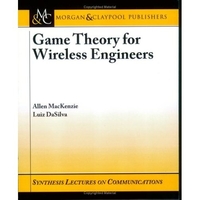Game Theory for Wireless Engineers
暫譯: 無線工程師的博弈論
Mackenzie/DaSilva
- 出版商: Morgan & Claypool
- 出版日期: 2006-03-21
- 售價: $1,610
- 貴賓價: 9.5 折 $1,530
- 語言: 英文
- 頁數: 86
- ISBN: 1598293605
- ISBN-13: 9781598293609
海外代購書籍(需單獨結帳)
買這商品的人也買了...
-
 Neural Network Design (Paperback)
Neural Network Design (Paperback)$1,100$1,078 -
 嵌入式 C 語言 (Embedded C)
嵌入式 C 語言 (Embedded C)$450$356 -
 Office 快速鍵隨手查
Office 快速鍵隨手查$149$127 -
 Office 2003 快易通
Office 2003 快易通$199$179 -
 Managing Agile Projects (Paperback)
Managing Agile Projects (Paperback)$2,390$2,271 -
 Matlab 7 程式設計
Matlab 7 程式設計$680$537 -
 BIOS Inside:BIOS 研發技術剖析, 2/e
BIOS Inside:BIOS 研發技術剖析, 2/e$620$490 -
 XML 理論與實務─Java 的 XML 應用程式開發
XML 理論與實務─Java 的 XML 應用程式開發$630$599 -
 絕代風華 Photoshop CS2 中文版
絕代風華 Photoshop CS2 中文版$480$408 -
 Java 認證 SCJP 5.0 猛虎出閘
Java 認證 SCJP 5.0 猛虎出閘$650$514 -
 Hacking Exposed Web Applications, 2/e (Paperback)
Hacking Exposed Web Applications, 2/e (Paperback)$1,930$1,834 -
 $690Building Scalable Web Sites: Building, Scaling, and Optimizing the Next Generation of Web Applications
$690Building Scalable Web Sites: Building, Scaling, and Optimizing the Next Generation of Web Applications -
 聖殿祭司的 ASP.NET 2.0 專家技術手冊─使用 C#
聖殿祭司的 ASP.NET 2.0 專家技術手冊─使用 C#$720$569 -
 新觀念 ASP.NET 2.0 網頁程式設計
新觀念 ASP.NET 2.0 網頁程式設計$600$474 -
 $2,210Effective Prototyping for Software Makers
$2,210Effective Prototyping for Software Makers -
 $743Microsoft Windows Workflow Foundation Step by Step (Paperback)
$743Microsoft Windows Workflow Foundation Step by Step (Paperback) -
 Visual C# 2005 程式設計經典
Visual C# 2005 程式設計經典$600$474 -
 ActionScript 3.0 精緻範例辭典
ActionScript 3.0 精緻範例辭典$550$435 -
 ASP.NET AJAX 應用剖析立即上手
ASP.NET AJAX 應用剖析立即上手$580$452 -
 精通 Exchange Server 2007 全功能企業訊息平台
精通 Exchange Server 2007 全功能企業訊息平台$550$435 -
 ActionScript 3.0 與 Adobe Flex 網路遊戲程式開發實務講座
ActionScript 3.0 與 Adobe Flex 網路遊戲程式開發實務講座$450$351 -
 現代嵌入式系統開發專案實務-菜鳥成長日誌與專案經理的私房菜
現代嵌入式系統開發專案實務-菜鳥成長日誌與專案經理的私房菜$600$480 -
 $990Microsoft Exchange Server 2007: Tony Redmond's Guide to Successful Implementation (Paperback)
$990Microsoft Exchange Server 2007: Tony Redmond's Guide to Successful Implementation (Paperback) -
 $1,102Wireless Communications and Networking (Hardcover)
$1,102Wireless Communications and Networking (Hardcover) -
 Windows Presentation Foundation 新一代使用體驗開發實務 (Windows Presentation Foundation Unleashed)
Windows Presentation Foundation 新一代使用體驗開發實務 (Windows Presentation Foundation Unleashed)$780$663
相關主題
商品描述
Description
The application of mathematical analysis to wireless networks has met with limited success, due to the complexity of mobility and traffic models, coupled with the dynamic topology and the unpredictability of link quality that characterize such networks. The ability to model individual, independent decision makers whose actions potentially affect all other decision makers makes game theory particularly attractive to analyze the performance of ad hoc networks.
Game theory is a field of applied mathematics that describes and analyzes interactive decision situations. It consists of a set of analytical tools that predict the outcome of complex interactions among rational entities, where rationality demands a strict adherence to a strategy based on perceived or measured results. In the early to mid-1990's, game theory was applied to networking problems including flow control, congestion control, routing and pricing of Internet services. More recently, there has been growing interest in adopting game-theoretic methods to model today's leading communications and networking issues, including power control and resource sharing in wireless and peer-to-peer networks.
This work presents fundamental results in game theory and their application to wireless communications and networking. We discuss normal-form, repeated, and Markov games with examples selected from the literature. We also describe ways in which learning can be modeled in game theory, with direct applications to the emerging field of cognitive radio. Finally, we discuss challenges and limitations in the application of game theory to the analysis of wireless systems. We do not assume familiarity with game theory. We introduce major game theoretic models and discuss applications of game theory including medium access, routing, energy-efficient protocols, and others. We seek to provide the reader with a foundational understanding of the current research on game theory applied to wireless communications and networking.
.
商品描述(中文翻譯)
**描述**
應用數學分析於無線網路的成功有限,這是因為移動性和流量模型的複雜性,加上無線網路特有的動態拓撲和鏈路品質的不確定性。能夠建模獨立的決策者,其行為可能影響所有其他決策者,使得博弈論在分析臨時網路的性能時特別具有吸引力。
博弈論是一個應用數學的領域,描述和分析互動決策情境。它由一組分析工具組成,預測理性實體之間複雜互動的結果,其中理性要求嚴格遵循基於感知或測量結果的策略。在1990年代初至中期,博弈論被應用於網路問題,包括流量控制、擁塞控制、路由和互聯網服務的定價。最近,對於採用博弈論方法來建模當今主要的通信和網路問題(包括無線和點對點網路中的功率控制和資源共享)越來越感興趣。
本書介紹博弈論的基本結果及其在無線通信和網路中的應用。我們討論正常型、重複型和馬可夫博弈,並選取文獻中的例子。我們還描述了如何在博弈論中建模學習,並直接應用於新興的認知無線電領域。最後,我們討論了將博弈論應用於無線系統分析中的挑戰和限制。我們不假設讀者對博弈論的熟悉程度。我們介紹主要的博弈論模型,並討論博弈論的應用,包括媒介存取、路由、節能協議等。我們希望為讀者提供對於博弈論在無線通信和網路應用的當前研究的基礎理解。












